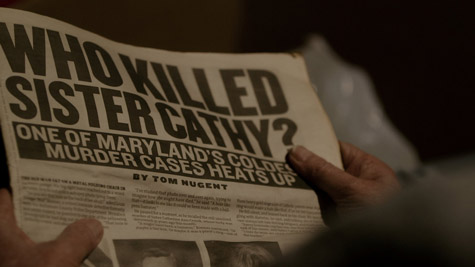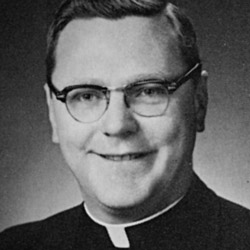
The story begins with two retired women who come together to try to solve the 1969 murder of Sister Cathy Cesnik, their former high school teacher. It sounds like the premise of a cute cozy mystery, but this story is anything but cozy. It’s a tale of abuse, pedophilia, cover-ups by the Catholic Church, and forbidden love, as this explosive documentary uncovers layer after layer of secrets across seven episodes.
The first episode introduces us to the facts of the case. It’s a chilling overview of an unsolved murder of a Catholic nun in a small town outside of Baltimore, Maryland. The physical evidence was almost non-existent at the time, and the two women—Abbie Schaub and Gemma Hoskins, former classmates at Archbishop Keough High School—attempt to find out what happened to their beloved teacher.
The amateur detectives began their search because journalist Tom Nugent had reached out to Hoskins about the case. She decided to post a message to the school’s alumni Facebook page, where she met and subsequently teamed up with Schaub to follow what information they could find that might lead them to more clues and, hopefully, an answer.
The interviews with witnesses, friends, and the detectives who were there give an intimate account of who Cathy Cesnik really was, and it’s not until Episode 2 that the documentary begins to delve into possible motives. And that’s when the real dirt comes to the surface.

The documentary also posits that both the Baltimore City Police Department and the Catholic Archdiocese of Baltimore were instrumental in covering up Maskell and other priests’ alleged sex-abuse crimes, even protecting Maskell when he was accused of murder. It’s chilling to see how many people came forward with stories about Father Maskell. He was sued by two of his alleged victims to no avail. He eventually fled to Ireland and died in 2001 as the Catholic Church negotiated payouts to some of his victims—though there is no record of him or any of his colleagues being arrested or charged with the alleged crimes.
But this is not the only motive presented. The documentary takes many twists and turns as the two women uncover more details. People come forward to claim that relatives of theirs actually committed the murder or helped with the murder. And on top of this, Sister Cathy was in love with another Catholic Priest—one who, years after Cathy’s death, left the church and got married. Could he have been her killer?
Though the documentary is never gruesome visually—Cathy’s body is never shown—it definitely portrays the abuses and scandals surrounding the murder in an honest and often graphic way. It’s not for the faint of heart. But it is definitely a series that’s keeping the bar high for the future of the true crime docuseries, as it surpasses Making a Murderer in compelling storytelling and phenomenal presentation, complete with an eerie soundtrack. This is the perfect series to binge watch over a long weekend, and I certainly hope that justice can be found for Sister Cathy Cesnik.
Watch the trailer for The Keepers!
Ardi Alspach was born in Florida, raised in South Carolina, and now resides in New York City with her cat and an apartment full of books. By day, she's a publicist, and by night, she's a freelance writer. You can follow her on Twitter at @ardyceelaine or check out her website at ardyceelaine.wordpress.com.

Prof Michael Clarke of King’s College London told the BBC the Russians had suffered a “major intelligence failure” in Kharkiv, underestimating the strength of Ukrainian forces and their capacity to rotate fresh troops to and from the front lines.